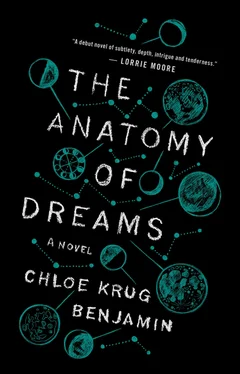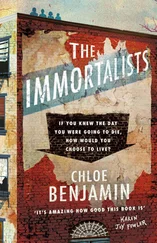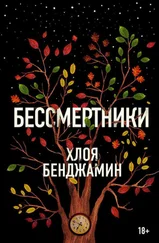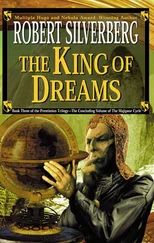Rodney was hired right out of college. Now he lived with his boyfriend, Peter, in a loft in Belltown. Downstairs, Peter ran a trendy ice cream company that sold counterintuitive, savory flavors: sweet arugula, prosciutto and fig, olive oil ribboned with red veins of balsamic. He had recently received a write-up in the Seattle Times , and now, on warm days, the line coiled around two blocks.
“Try the sweet arugula with the olive oil and balsamic,” Peter said when we arrived, swinging open the door of an industrial freezer. “It’s the most popular thing on the menu! I call it the Naughty Salad.”
While Rodney was at work, I hid out in a massive deli in downtown Seattle, where the patrons were as hopelessly unhip as I felt. As large as a school cafeteria and stubbornly devoid of any cultural identity, the deli was home to a bewildering buffet: there were bagels, sushi, a Chinese noodle bar, a sandwich station, eight steaming trays of Indian food. It was cheap and crowded, dully safe, the kind of place where people only came to disappear.
I sat at a long bar in front of the window with a plate of chicken tandoori and a Chinese dessert, translucent and shaped like a drawstring pouch. Outside, it was somber and drizzly; the two umbrella buckets in the deli’s entrance were stuffed to capacity, and a pile of additional umbrellas lay to one side. I had just finished eating when a tall figure came through the doors and stopped.
He wore a slick black raincoat and expensive-looking, Italian-looking shoes—the golden-brown color of scotch with leather tassels at the toes. The bottoms of his slim slacks were drenched, and his strawberry hair was thinning; at the crown of his head was a pink bald spot, dappled with raindrops. He hunched as if the ceiling in the deli were slightly too low.
There was a moment in which we both weighed the costs and benefits of pretending we hadn’t seen each other. Then he sighed and offered a small, grim smile.
“Sylvie Patterson,” he said. “I thought it was you.”
I was stunned numb. Like the second in which a toe is stubbed or a finger jammed, I felt the impact but not yet the sting. I glanced at the tables nearby, but the people around us were unconcerned, engaged in conversation or tabloid magazines or the complicated disentangling of wads of chow mein.
“I never knew your last name,” I said. “That’s strange, isn’t it?”
“Perkins.”
“Perkins. Thom Perkins.”
“That’s it,” said Thom. “I never thought I’d see you again.”
His voice had the same playful inflection I remembered, but it was effortful now, his smile wooden, like an actor forced to play a part he had long ago outgrown.
We regarded each other. I wondered if I looked as old to him, as changed, as he did to me. His eyes were sparsely lashed, a chilly, arctic blue. The skin of his cheeks looked translucent and exposed.
“I suppose there are a few different ways this could go,” he said.
I had no idea what he thought of me—whether he was resentful or bewildered, whether he’d passed me off as crazy. Through the years, I’d remembered snatches of my time with Thom, and I had stitched the story together square by square. Scratching a mosquito bite, I saw my head against his crossed ankles, our bodies making an L shape on the floor and crumpling with laughter. Going through a turnstile at the BART station, I remembered crawling under the broken fence plank, Thom helping to pull me through. We stole through the yard and tugged the basement door closed, the moon swallowed like a lump in the throat.
A subway train squealed its approach, and I heard Louis Armstrong on low as we clung and spun together, Thom singing a hushed harmony. The way you hold your knife; the way we dance till three . . . A drizzly Thursday morning in October, pouring hot water into a packet of oatmeal: You promised you’d show me, he said, you promised —and we were wrestling, knees scraping the concrete floor, until I let him peel my fingers open and out fell a small yellowed photo in a plastic frame. Solemn gaze, ketchup fingers, the bangs my mother cut below a bicycle helmet: the only childhood photo I have.
And this: A tinkle of Christmas bells. Our hands on a glass door, breaths drifting through the air like parachutes. Inside, we took our gloves off and raked our cold red fingers through the candy aisle. It was the twenty-four-hour gas station on Williamson, blocks from our houses. We were attached at the neck, a thick black scarf of Thom’s wound around both of us at once. I blew the fringe out of my mouth. He chose a Twix. Why do you always get to pick? I asked. Last time it was the—
Snatches. Half memories: pathetic, wispy things. Often, they’d leave off like this, in the middle of a sentence. But it didn’t really matter how I finished the sentence. What mattered was that now I could remember I’d said it.
It occurred to me now that I’d never told him good-bye.
“Do you want to sit down?” I asked.
Thom paused. Then he set his briefcase down and shook off his coat, hanging it on the back of the chair beside me.
“I only have a few minutes,” he said, sitting down. “I have a meeting.”
“Where do you teach?”
He looked at me quizzically. “Teach?”
“I just—I assumed you were a professor.”
“Ah.” He laughed shortly. “No, I don’t teach. Had to give up the old Romanticism when Jan was born. Grad students don’t make very much money. Neither do professors, for that matter—not unless you get lucky. I didn’t.”
“I’m sorry.”
“Don’t be. I was never going to finish that dissertation, anyway.”
We sat side by side, looking out at the street. Men in suits and sharp-heeled women passed interchangeably in front of us. There must have been two feet of space between our chairs.
“Jan,” I said. “Is that your son?”
“I hope so.” There was a glint of his old puckishness, a lightbulb swinging in the dark. “He’s my oldest. Then there are the twins.”
He rooted around in his pocket and came up with a battered leather wallet, flicking it open. Inside a clear sleeve was a family photo, taken against a marbled studio background. Thom sat in a stiff-backed chair with a child on his lap. The boy looked to be four or five, with fiery red hair and a solemn gaze that matched his father’s. Janna sat beside them, wearing a puff-sleeved floral dress and a canary-yellow, off-kilter hat. Her hair was cropped short, and it was a pale, diluted blond—what must have been her natural color. At her feet were twins, a boy and a girl, both in suspenders and shorts. Their hair was white-blond and cowlicky, and they had familiar smiles: catlike, toothy, the incisors crooked and sharp.
“Henrik and Inger,” said Thom, pointing. “Hooligans, those two.”
I didn’t ask about Janna, but neither did he ask about Gabe. He put the photo away.
“How did you end up here?” I asked—I couldn’t help myself. “I never thought I’d see you in a place like this.”
“A place like what?” he asked, one eyebrow arched.
“I don’t know—like this .” I waved a hand, looking around at the people reading newspapers at single-person tables or eating the miniature pickles that came free with each sandwich. “It’s so—corporate.”
“Snob. Have you tried the chicken tandoori?”
“I have, in fact,” I said, gesturing to my empty paper plate, where orange oil had melted into psychedelic pools.
But the routine had become tired. It took an extraordinary amount of effort to make our conversation appear so effortless, to conceal the strain it took to ignore the subjects that stood so persistently between us.
“No,” said Thom. “The story’s not very exciting, I’m afraid. When Janna got pregnant, we both decided it would be best if I left the university. My cousin found me a copywriting job here. I’ve been in pharma ever since—that’s pharmaceuticals to you outsiders. Basically, I write the little black script at the end of commercials and magazine ads, the stuff that reminds you not to take your antidepressant while operating heavy machinery or drinking like Dylan Thomas. It’s a rare trade—requires years of apprenticeship. You may have seen my work in last month’s issue of Cosmopolitan .”
Читать дальше












